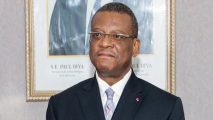Categories
Recent Posts
- Football: Panthère du Ndé Wins Cameroon Cup 2025
- Fifa brings in new £45 ticket for 2026 World Cup
- President Sisiku Ayuk Tabe, top aides to appear before the Supreme Court
- Pressure mounts on Biya as speculation grows over possible replacement of Ngute
- 2025 is the year when Biya’s long rule finally lost its last convincing justification
Archives
- December 2025
- November 2025
- October 2025
- September 2025
- August 2025
- July 2025
- June 2025
- May 2025
- April 2025
- March 2025
- February 2025
- January 2025
- December 2024
- November 2024
- October 2024
- September 2024
- August 2024
- July 2024
- June 2024
- May 2024
- April 2024
- March 2024
- February 2024
- January 2024
- December 2023
- November 2023
- October 2023
- September 2023
- August 2023
- July 2023
- June 2023
- May 2023
- April 2023
- March 2023
- February 2023
- January 2023
- December 2022
- November 2022
- October 2022
- September 2022
- August 2022
- July 2022
- June 2022
- May 2022
- April 2022
- March 2022
- February 2022
- January 2022
- December 2021
- November 2021
- October 2021
- September 2021
- August 2021
- July 2021
- June 2021
- May 2021
- April 2021
- March 2021
- February 2021
- January 2021
- December 2020
- November 2020
- October 2020
- September 2020
- August 2020
- July 2020
- June 2020
- May 2020
- April 2020
- March 2020
- February 2020
- January 2020
- December 2019
- November 2019
- October 2019
- September 2019
- August 2019
- July 2019
- June 2019
- May 2019
- April 2019
- March 2019
- February 2019
- January 2019
- December 2018
- November 2018
- October 2018
- September 2018
- August 2018
- July 2018
- June 2018
- May 2018
- April 2018
- March 2018
- February 2018
- January 2018
- December 2017
- November 2017
- October 2017
- September 2017
- August 2017
- July 2017
- June 2017
- May 2017
- April 2017
- March 2017
- February 2017
- January 2017
- December 2016
- November 2016
- October 2016
- September 2016
- August 2016
- July 2016
- June 2016
Featured
 2025 is the year when Biya’s long rule finally lost its last convincing justification
2025 is the year when Biya’s long rule finally lost its last convincing justification  Young Cameroonians: Build social capital to succeed
Young Cameroonians: Build social capital to succeed  Eulogy for HRH Nfor Professor Teddy Ako of Ossing
Eulogy for HRH Nfor Professor Teddy Ako of Ossing  Will Fr. Paul Verdzekov recognize the refurbished and rededicated Cathedral in Bamenda were he to return today?
Will Fr. Paul Verdzekov recognize the refurbished and rededicated Cathedral in Bamenda were he to return today?  Cameroon apparently under a de facto federalism
Cameroon apparently under a de facto federalism
Most Commented Posts
 4 Anglophone detainees killed in Yaounde
4 Anglophone detainees killed in Yaounde
18 comments Chantal Biya says she will return to Cameroon if General Ivo Yenwo, Martin Belinga Eboutou and Ferdinand Ngoh Ngoh are sacked
Chantal Biya says she will return to Cameroon if General Ivo Yenwo, Martin Belinga Eboutou and Ferdinand Ngoh Ngoh are sacked
13 comments The Anglophone Problem – When Facts don’t Lie
The Anglophone Problem – When Facts don’t Lie
12 comments Anglophone Nationalism: Barrister Eyambe says “hidden plans are at work”
Anglophone Nationalism: Barrister Eyambe says “hidden plans are at work”
12 comments Largest wave of arrest by BIR in Bamenda
Largest wave of arrest by BIR in Bamenda
10 comments
Latest Tweets
Featured
-

Football: Panthère du Ndé Wins Cameroon Cup 2025
-

Fifa brings in new £45 ticket for 2026 World Cup
-

President Sisiku Ayuk Tabe, top aides to appear before the Supreme Court
-

Pressure mounts on Biya as speculation grows over possible replacement of Ngute
-

2025 is the year when Biya’s long rule finally lost its last convincing justification
-

Armed Mbororo tribesmen killed 8 in Southern Cameroons’ new war
-

Southern Cameroons Crisis: Atanga Nji Boys abduct 8 people en route to Kumbo
© Cameroon Concord News 2025
22, August 2016
Cameroon Airlines-Camair-Co: From Boom to Bust 0
Some 34 years ago, Cameroon Airline Company was flying high. The Ahmadou Ahidjo responsible leadership led to a booming economy and made Cameroon Airline Company the fastest growing and the city of Douala the most competitive aviation market in West and Central Africa. The company acquired new carriers and bought new jets. To be sure, Cameroon Airlines ordered Boeing and Airbus jetliners worth millions of dollars.
On November the 6th 1982, the office of the president of the republic changed hands from Ahmadou Ahidjo to Biya Paul in a peaceful atmosphere. There was no global recession but a sharp increase in passenger numbers (top CPDM government officials, their wives, children, mistresses and housemaids) traveling to and from Europe without paying a dime to the airlines company. This was bad news for Cameroon Airlines, sad for the Cameroonian people but joy to the new comers in government. It was the beginning of rigor and moralization of the Cameroon airlines company.
Cameroon Airlines was plagued by financial difficulties, which came along with a poor safety and maintenance record. On 16 September 2005, the airline was indefinitely banned by the French Civil Aviation Authority from operating its prestigious Paris route due to safety concerns that had arisen following aircraft check-ups that had revealed failures to meet international norms in the loading, transport of dangerous materials, navigation documentation and tire maintenance.
In an effort to save the airline from bankruptcy, the Biya regime signed an agreement with SN Air holding, the parent company of Brussels Airlines to ensure the future funding. The plans did not materialize, though. Instead, on 11 September 2006, the launch of Camair-Co as new national airline was announced. Cameroon Airlines stayed operational until March 2008, though flight operations had only taken place during irregular intervals over these last years. Things have taken a dramatic u turn and we of this publication can now reveal that the so-called Camair-Co has only two planes. The small flight which runs the Douala-Baffoussam route and the 114 seater that goes to the Northern regions.
Camair-Co’s Boeing 767-300 code named (The Dja), which recently returned to Cameroon after six months of inactivity following a routine technical control with the Ethiopian Airline hangar in Addis Abba, is now stagger-a-staggering. After very intensive and productive investigation following a leak published by Alafnet.com,Cameroon Intelligence Report wishes to sound a note of caution that air passengers should avoid using Camair-Co’s Boeing 767-300.
The aircraft cockpit of the Dja completely destroyed by water which entered through a window that was deliberately left open will cost the company billions of FCFA. We understand that there is a war currently going on between the Minister Edgar Alain Mebo Ngo’o faction and the Akame Mfoumou gang. There are reports that Camair-Co plans to put the Dja back on the skies without proper technical checks. President Biya is aware of the situation through one of his relatives serving with the company in Douala. Camair-Co’s unofficial debt stands at 74 billion FCFA, though Transport Minister Alain Mebo Ngo’o keeps incessantly flashing out signals to the Cameroonian people that it is below 40billions FCFA.
Our intelligence officers who have been working on this Camair-Co saga hinted that the “Dja Window Rain Water” incident remains a diabolic harsh in-house ploy to enable the general manager, Jean Nana Sandjo lease an aircraft through AJW leasing company for the Hajj pilgrimage.
At the time of the window neglect accident in Douala, Jean Nana Sandjo was already in France negotiating with the AJW Group for a plane. Curiously, Nana Sandjo is the representative of the said leasing company and banks a 6 %commission on every deal with Camair-co. Jean Nana Sandjo’s list of financial crimes is long involving too many dodgy deals.
This is more bad news for Cameroon as Jean Nana Sandjo, an acolyte of Eduard Akame Mfoumou-a behind the scene baron of the CPDM regime has pushed Camair-Co to be weighed down by overcapacity, debt and the CPDM government’s willingness to provide bailouts running to the tune of 200 billion FCFA. With just 2 carriers, Camair-Co has been forced to slash their operations and reduce ticket prices. Cameroon aviation is badly in need of a regime change-a decent Anglophone citizen to run the affairs of this company.
The Southern Cameroons change will include deferring aircraft deliveries, cancelling orders, rationalizing routes and trimming staff to stave off financial collapse. Our chief economic correspondent noted that it’s going to be tough, but it can be done if Biya mean business. Our nation is at the mercy of Biya, his family and his appointees. Every aspect of Cameroon’s economic life has been hardest hit by the consortium of CPDM crime syndicates.
CPDM officials say Camair-Co may smile again and resume normal operations once another bailout package is made available by the ministry of transport. But Alfred Bate Bawak former CPDM UK Section Vice President say that it may be difficult because the industry has yet to solve a basic problem: too many airlines such as Air France, Air Brussels, Ethiopian Air Lines flying too many flights in a country that, despite its economic growth, is relatively poor.
Lowering fares may attract more African travellers but it may not improve the overall financial health of the industry controlled by corrupt officials. To make profits, Camair-Co needs an Anglophone marketer at the head to shift business models. Above all, Camair-Co has to think, act, breathe and be low cost. That doesn’t happen overnight with an 84 years old man as chief executive.
By Soter Tarh Agbaw-Ebai